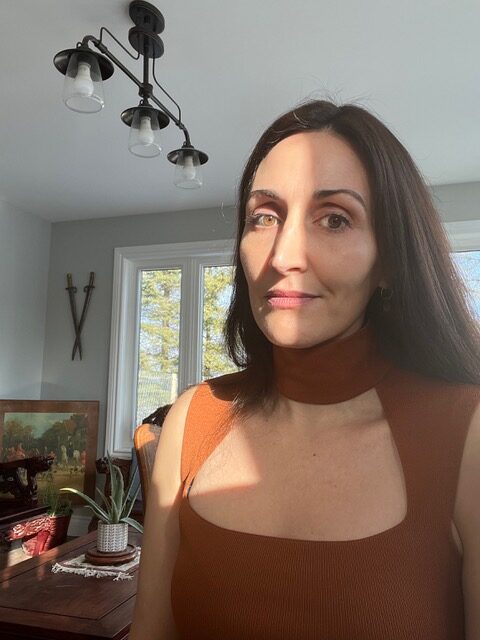A Conversation with Hollay Ghadery, Winner of the 2022 Nick Blatchford Occasional Verse Contest
By Kim Jernigan and Hollay Ghadery
Kim Jernigan: The poem is in the form of a letter home from a soldier at Fort Henry, Kingston in 1837. Can you provide our readers with the historical context for the poem? I’m also interested in your choice of an epistolary form, a letter home from a man at war. It opens with the line “ask your husband about the honey bees…” which raises the question of what relationship the writer has to the addressee.
Hollay Ghadery: The poem is written from the perspective of a man imprisoned in Fort Henry during the Rebellion of 1837-38, when people in Upper and Lower Canada were getting frustrated with the lack of responsible government. They began to rebel against the Crown and the conservative minority who were in power at the time. One of the men who took part in the Rebellion was Joseph Gould—a man from Uxbridge, Ontario (the small town my family moved to when I was 11 years old). It is through his persona that I write the poem, though I make no claims on complete historical accuracy. “Rebellion Box” is a creative interpretation. The letter felt like an obvious choice for the form. I first heard of rebellion boxes during a lecture at the Uxbridge Museum by local historian Allan McGillivray, and he mentioned that men would often send these boxes home to their loved ones with little sayings written onto the box. And the boxes would sometimes be accompanied by letters. In the case of Gould, he wanted to write to his intended, Mary, but he was a Quaker and the propriety at the time meant he could not correspond directly with her. So, he wrote to Mary’s mother, and that is to whom it speaks. His letter starts formally, but slowly unravels so that it is as if, at points, he is talking directly to Mary.
Kim Jernigan: Can you also shed some light on the bee sting? What it suggests about the relationships
in the poem, how, for instance, the being stung has both literal and figurative resonance?
Hollay Ghadery: The sting is meant to reflect how when the speaker is in pain (mental, physical, existential) or distressed, he turns his thoughts to the person he loves—Mary—and her simply existing brings him comfort. “But Mary was in blue, and it was something else to think about.”
The exact words Joseph Gould wrote on the box he sent home for Mary were this:
When liberty with all its charms
Shall comfort the distressed
Then I’ll return with open arms,
And clasp you to my breast.
It is perhaps worth noting that Mary and Joseph were married three months after his eventual release from prison.
Kim Jernigan: The speaker says “I won’t stand for futility.” Can you shed some light on what this means in the context of the poem? I’m also interested in some of the imagery you use. What, for instance, are “marzipan creek pebbles”?
Hollay Ghadery: A large group of rebels were arrested after a raucous meeting at Montgomery’s Tavern (which I believe used to be on Yonge Street in what is now Richmond Hill) and brought to Fort Henry, where many were tried and even executed for high treason. Gould was not only part of the rebellion, but he helped led it. He had very high ideals and hopes. In his writing, he quite literally spelt “liberty” with a capital L. Imprisonment must have made him feel impotent. But, in making the boxes (he also made one for this sister) and writing home, he was also planning for the future. He continued to fight against the futility of his circumstance and the system that was trying to break him. And yes! Those sweet little pebbles. I imagined the men in prison weren’t afforded a diverse or particularly tasty diet, so their favourite foods—perhaps favourite childhood foods—might slip into their memories. Remembering pebbles in a creek, those pebbles might begin to look very much like little balls of marzipan.
Kim Jernigan: Is the poem a one off or part of a longer sequence of poems? And on a more frivolous note, how have you spent the prize money?
Hollay Ghadery: This poem was written as a part of a series of poems that explore the lives of local historic figures. Lucy Maud Montogomery and Thomas Foster also have poems written for or after them in this series. All are in my poetry collection coming out in April with Radiant Press, also titled Rebellion Box. And the prize money! I’d like to switch my home from propane heating to geothermal in an effort to become less reliant on fossil fuels. The switch is expensive, so the money has been earmarked to go toward that. I don’t know if that’s very exciting but it brings me comfort!

Hollay Ghadery is a multi-genre writer living in rural Ontario on Anishinaabe land. She has her MFA in Creative Writing from the University of Guelph. Her work has appeared in various literary journals and magazines. Fuse, her memoir of mixed-race identity and mental illness, was published by Guernica Editions’ MiroLand imprint in 2021. Her debut collection of poetry, Rebellion Box, is due out with Radiant Press in spring 2023 and her short-fiction collection, Widow Fantasies, is scheduled for release with Gordon Hill Press in 2024.
Photo by Dmitry Grigoriev on Unsplash

